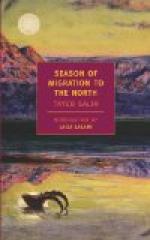There came out of Northern British Columbia last year the Indian wife and half-breed daughters of an H.B. Co. Factor. They were bound for Montreal and it was their first trip “outside.” The Commissioner at Winnipeg contradicts the old saw, and surely has “a soul above a beaver-skin”; like Mulvaney, too, he “has bowels.” Quickly went forward a letter to a tactful woman in the border-town through which the visiting ladies must pass—“Meet them, and see that they get the proper things to wear in society circles in Montreal. I don’t want them to feel ill at ease when they get there.” Stories like these give us glimpses of the kind of paternalism exercised by the Ancient Company, the one trust that has never ground the faces of the poor, and in whose people to-day appears the “constant service of the Old World.”
The big books of The Company a year or two ago in unmistakable round-hand declared that one Running Rabbit, lawful widow of Blueskin, was entitled to draw from the coffers clear-side bacon and a modicum of flour. But one quarterly paysheet, returned to Winnipeg from Fort Churchill, showed that Running Rabbit in addition to her food allowance had been handed out forty cents’ worth of cotton. Stern enquiry, backed by red-tape and The Company’s seal as big as a saucer, was sent up to the Churchill Factor. Why had the allowance of Mrs. Blueskin (nee Running Rabbit) been exceeded? By “return mail” nine months later the Factor reported,
“The widow’s gone,
Her tent’s forsaken,
No more she comes
For flour and bacon.
N.B. The cotton was used for her shroud.”
The Ancient Company was penny-wise, but in spite of the copybook line, not pound-foolish, as its dividend paysheets conclusively prove.
There is no desire to show forth these silent ones of the North as infallible men and immaculate. They make many mistakes; they were and are delightfully human, and we couldn’t picture one of them with a saintly aureole. But in the past, as in the present, they were large men; they honoured their word, and you couldn’t buy them. Men of action, whether inside fort walls, bartering in the tepee of the Indian, or off on silent trails alone,—it has been given to each of them to live life at firsthand. In every undertaking the determining factor of success is men, and not money or monopoly. And because the North still breeds men of the H.B. type, the eye of The Great Company is not dimmed, its force not abated.
We spoke with no fewer than three men at The Landing who came into the North in the year of the Klondike rush, that is, just ten years ago. Into the human warp and woof of the Great Lone Land of Northern Canada the Klondike gold-rush intruded a new strand. The news of the strike on Yukon fields flashed round the world on wires invisible and visible, passed by word of mouth from chum to chum, and by moccasin telegraph was carried to remotest corners of the continent.




